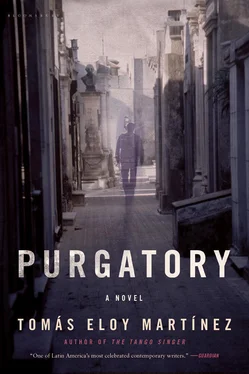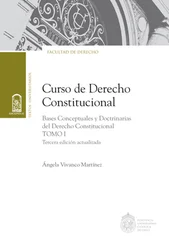Tomás Eloy Martínez - Purgatory
Здесь есть возможность читать онлайн «Tomás Eloy Martínez - Purgatory» весь текст электронной книги совершенно бесплатно (целиком полную версию без сокращений). В некоторых случаях можно слушать аудио, скачать через торрент в формате fb2 и присутствует краткое содержание. Год выпуска: 2008, Издательство: Publishing PLC, Жанр: Современная проза, на английском языке. Описание произведения, (предисловие) а так же отзывы посетителей доступны на портале библиотеки ЛибКат.
- Название:Purgatory
- Автор:
- Издательство:Publishing PLC
- Жанр:
- Год:2008
- ISBN:нет данных
- Рейтинг книги:5 / 5. Голосов: 1
-
Избранное:Добавить в избранное
- Отзывы:
-
Ваша оценка:
- 100
- 1
- 2
- 3
- 4
- 5
Purgatory: краткое содержание, описание и аннотация
Предлагаем к чтению аннотацию, описание, краткое содержание или предисловие (зависит от того, что написал сам автор книги «Purgatory»). Если вы не нашли необходимую информацию о книге — напишите в комментариях, мы постараемся отыскать её.
"Purgatory" narrates the anxiety of the love lost and then found in a magnificent reconstruction of the sinister events that went down in the time of the regime in Argentina.
Purgatory — читать онлайн бесплатно полную книгу (весь текст) целиком
Ниже представлен текст книги, разбитый по страницам. Система сохранения места последней прочитанной страницы, позволяет с удобством читать онлайн бесплатно книгу «Purgatory», без необходимости каждый раз заново искать на чём Вы остановились. Поставьте закладку, и сможете в любой момент перейти на страницу, на которой закончили чтение.
Интервал:
Закладка:
‘It was me? How embarrassing.’
‘It was you.’
‘No, during those months I had stopped being me. I started to lose myself when you left. Or, what is worse, I became someone I didn’t want to be. It’s too late, Simón. I’m sixty years old. You’ve already given me more than I deserve, you have made me happy. You can go now, you can save yourself. I’m not worth anything. I don’t even matter to me.’
‘That’s not true. If it were true, I wouldn’t have come back. You started to lose yourself, as you rightly say: that’s a different matter. You lost a part of yourself. With what remains, you can start again. Don’t undervalue yourself. I love you.’
‘I love you too, I love you so much, so much. I don’t know what to do with myself.’
‘What to do? The life you’re living has diminished you. I’ve seen the pile of useless coupons you collect to buy things you’ll never eat: money-off vouchers for pickles, Campbell’s soup, chocolate puddings. And the bingo cards. And the false nails. And the friends you’ve chosen. Instead of being your mirror, they are your humiliation. What have you done with your life, Emilia?’
‘Nothing, that’s the worst of it. I’ve done nothing with it. It is my life that has done everything to me.’
Some weeks after the visit to Dr Schroeder, no trace of the mother’s tumour remained. The doctors who had recommended surgery performed two further sigmoidoscopies and incredulously admitted that the tissue now appeared to be healthy. In all other ways, she had got worse. She still did not recognise anyone, she confused the past and the present, her memories were muddled and she was doubly incontinent. Emilia had to go back to her job at the Automobile Club and could not continue caring for her. At the nursing home, she had met two excellent nurses, who were fond of her mother and agreed to care for her in alternating shifts. But Dr Dupuy had had enough. He considered that he had done more than was necessary to respect his wife’s unshakeable will to live and that it was now time to shut her away in a home to be cared for by professionals. Had Ethel decided to be immortal, there she would be able to enjoy a perfect eternity, with no memory, no world. She greeted all displays of affection with the same indifference. When Chela kissed her forehead her expression was exactly the same as when the Eel’s wife stroked her hands. She greeted everything with a beatific, meaningless smile. What difference did it make, then, whether she was cared for by her daughters or by nurses who were strangers to her? The nurses, at least, would clean her up more promptly. Chela insisted that a nursing home was the best place for her. Her friends knew nursing homes where patients were like guests in five-star hotels. Emilia, on the other hand, had heard horror stories about such places: old people left to God’s tender mercies, ill-fed, their sheets and mattresses never washed or aired, human beings tossed onto the scrapheap and left to die. ‘You’re both exaggerating,’ Dr Dupuy insisted. ‘I will make sure that Ethel is in the best facility in Buenos Aires. Chelita is getting married soon and what are we supposed to do with her on the wedding day, how do we protect her from the commotion, the telephone, the guests? I always know what’s for the best,’ said Dupuy. It was a phrase Chela loved to repeat: ‘You know me — whatever Papá decides is for the best.’
In a country that had been many years divided, Dupuy had long since learned to predict the winning side and distance himself in time from those about to lose. When he confined his wife in the institution in Parque Chacabuco he was proud that he had never yet been mistaken. He had succeeded in persuading Marcelito Echarri to propose to his daughter Chela (he could hardly claim the boy was in love) and agree to marry her. Even her father could not deceive Chela. She was impulsive, thoughtless and at the least effort declared herself exhausted. Marcelito, on the other hand, had graduated from Wharton with honours and had the makings of a first-class son-in-law. He had worked as a financial adviser in Miami but wanted to move back to Buenos Aires. When Dupuy discovered this, he immediately hired him to write a financial column for La República . In his first article, Echarri advised state-run companies to take advantage of easy foreign lines of credit which offered advantageous rates of interest. Now was the time to take a gamble, was his advice. And he was right. The companies secured loans at no risk to themselves since the Central Bank acted as guarantor. They made fortunes and gave Dupuy unlimited access to the private jets and the villas in Europe. ‘The respect I enjoy now is fully deserved,’ Dupuy told Echarri. ‘After so many years without one false step, people finally respect and fear me.’
There was only one mistake for which he reproached himself, but he never spoke of it to anyone. It had happened when, against his better judgement, he had allowed his eldest daughter to marry an insignificant cartographer whose background seemed so disreputable that he did not even bother to have it checked out. This was a serious mistake. The young man had been a student leader in the geography department, a member of the youth wing of the Montoneros and a left-wing idealist so arrogant he had dared to expound on his ideas at family gatherings. Out of force of habit, he initiated an investigation, but the files with the relevant information arrived too late, after the wedding Mass, when it was no longer possible for man to put asunder what God had joined together.
All his life, Dupuy had remained true to his Christian principles and he was convinced that this was why God was showering him with blessings. He expected surprises from Emilia, from his lunatic wife, but not from Chela. And yet it was she who put his faith to the test.
A few months before the date set for the wedding, she began waking up with dark circles under her eyes, she would wander around the house not bothering to get dressed until late in the afternoon, lock herself in the bathroom for hours at a time, she did not even bother to answer the telephone, which rang at all hours of the day and night. The telephone had been her passion, there was nothing she enjoyed more than talking to her girlfriends about the details of her trousseau, about what to wear on the beach, how many pairs of sandals to take, whether Bahía or Ipanema was the more romantic place for a honeymoon. The wedding day was drawing near and still Chela sat staring at the television, watching soap operas all afternoon, as though she had decided to retreat from the world. There was little difference between her and a nun. She only got to her feet when Marcelo Echarri arrived, as he did punctually every day after work at La República . She would shut herself away with him in her room, which smelled of damp and dirty laundry, and they would talk and talk for hours. Emilia was intrigued to know what kept them so occupied and finally resolved to ask her sister with whom she had not exchanged a word for several months.
‘I don’t know what sort of reaction you’re waiting for,’ she said. ‘Whatever is going on can’t be so serious that you have to lie around in bed all day as though you were dying. If you’re not in love with Marcelo any more, that’s easily fixed. Postpone the wedding, or cancel it. A mistake like this is something you’ll end up paying for your whole life. He’s strong, he’s intelligent, he’ll get over it—’
‘You don’t understand,’ Chela interrupted her. ‘It’s serious, it’s really serious. I can’t get married. I’d be a laughing stock. I’m pregnant. If you look hard, I’m already showing. I’ve been wearing loose dresses — luckily, the peasant style is in fashion right now, ruffles and flounces and overskirts, but this fucking bump just keeps growing.’ She sobbed inconsolably. ‘Who’s the father?’ Emilia asked, alarmed. ‘Who do you think it is?’ Chela shouted. ‘It’s Marcelo. What do you take me for, a whore?’ ‘So, what’s the problem then? He doesn’t want to marry you any more? He doesn’t want the baby, doesn’t want you?’ ‘No, no, God, it’s so difficult trying to explain things to you. It’s hard to believe we’re sisters. I’m the one who doesn’t want the baby. I want to have an abortion before it’s too late. My last period was three months ago. I can’t get married like this, I don’t want four hundred people watching me walk down the aisle with a big belly. Can you imagine the gossip, the whispering? Just like you a minute ago, people will wonder whether Marcelo is the father, whether Papá is forcing him to marry me. Can you see me walking down the aisle in a white dress seven months pregnant? It would be in all the magazines, I’d look like a fool.’ ‘No one will dare publish a thing,’ said Emilia. ‘ Papá will quash any rumours. You need to get a grip. Children are not something to be hidden or aborted. You need to tell Papá before your gynaecologist does.’
Читать дальшеИнтервал:
Закладка:
Похожие книги на «Purgatory»
Представляем Вашему вниманию похожие книги на «Purgatory» списком для выбора. Мы отобрали схожую по названию и смыслу литературу в надежде предоставить читателям больше вариантов отыскать новые, интересные, ещё непрочитанные произведения.
Обсуждение, отзывы о книге «Purgatory» и просто собственные мнения читателей. Оставьте ваши комментарии, напишите, что Вы думаете о произведении, его смысле или главных героях. Укажите что конкретно понравилось, а что нет, и почему Вы так считаете.












